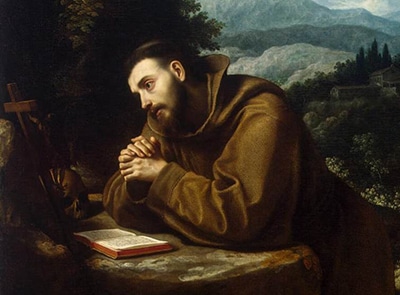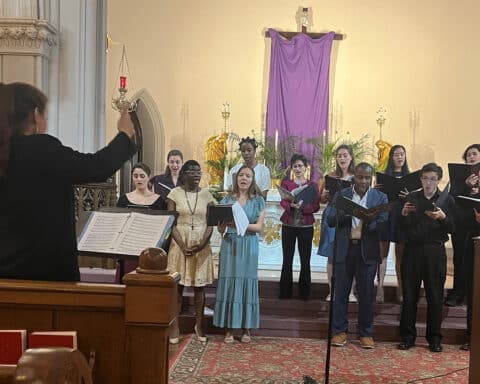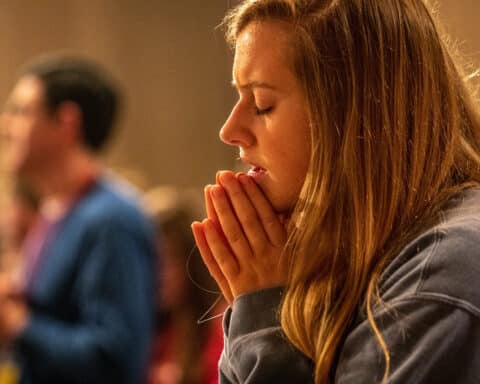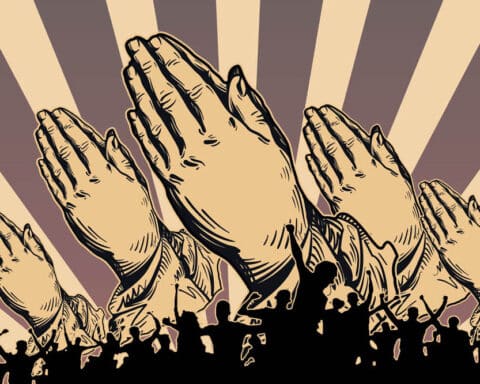We are happy to be done with 2020. We are glad this year of too much death, fear, suffering and strife is over. However, replacing our old calendars with new ones will not automatically change things. What changes things is prayer. We may feel we have been praying for months and it has not made much difference. Consider words seen on an outdoor church sign: “Prayer does not change things. Prayer changes us.” That is what we need for 2021 — a kind of prayer that can change us. A kind of prayer that can bring us peace and hope even in the midst of worry. That kind of prayer is contemplation.
Contemplation is a perfect prayer for anyone. When we are too busy, we can carry contemplation with us in our hearts. When we are too bored, contemplation opens our eyes to new and wonderful possibilities for love and action. Contemplation is a prayer of peace for the busy and a prayer of hope for the bored.
The idea of contemplation may sound intimidating. We may think it is a form of prayer reserved for the super holy — those monks and nuns hidden away behind stone walls. Actually, contemplation is a simple and wonderful way for all of us to know God more fully.
What is contemplation

The Catechism of the Catholic Church says there are three forms of prayer. The first form is vocal prayer. This is talking to God. All the prayers that we “say” are vocal prayers. The second form is meditation, which is thinking about God. A popular form of meditation is reflection on Sacred Scripture. The third form is contemplation, which is listening to God. This is, perhaps, the least known way for us to pray simply because, in our relationship with God, we have spent most of our lives doing all the talking.
The “United States Catholic Catechism for Adults” calls contemplation a time of silent listening and love. Like listening to good music, it would be best if we could sit back, close our eyes and simply listen for God to speak into our hearts. This is the purest form of contemplation. However, we live in a busy world. Just as we now carry our music with us wherever we go, we must learn to listen for God’s voice while we are busy doing other things.
We do not need to close ourselves off in a windowless room to come to know God better. St. Teresa of Avila, who wrote the spiritual classic “The Interior Castle,” stressed, “God wants you to worship him through an active life.” The Catechism of the Catholic Church says we all should be “dedicated to contemplation” (No. 771). And in Laudato Si’, Pope Francis told us to ask God to, “Teach us to discover the worth of each thing, to be filled with awe and contemplation” (No. 246).
The disciples on the road to Emmaus give us a great example of what contemplation looks like. It is simply letting Jesus draw near and walk with us. It is letting him teach us. It is inviting him to stay with us. When we do this, he will open our eyes and we will begin to know who he is and where he is in every situation. He will show us things are not as bad as we fear.
Genesis tells us when God created our world, he paused often to look at what he had done and to see that it was good. Contemplation is that simple. It is learning to look at each new day and see that it is good. It is learning to see hope and peace where we are tempted to see turmoil and despair.
A simple strategy
Since our God is mostly a silent God, it can be difficult to hear him, especially in our noisy world. But we can strive to see as he sees. Our world has long forgotten what paradise looked like. But God remembers. Our own prejudices, media, past life events and a myriad of other influences have taught us to see the world in a very flawed way. We have to learn to look with God’s eyes. This is the beautiful gift of contemplation.
It has been said that we humans look at the tangled and knotted back of the tapestry, while God sees the stunning picture on the front. A great New Year’s resolution would be to ask ourselves on a very regular basis, “How is God seeing this moment?” We may begin to discover that, “God does not see as a mortal, who sees the appearance. The Lord looks into the heart” (1 Sm 16:7).
Seeing with God’s eyes connects us with the Father, Son and Holy Spirit. Scripture reading is most helpful. In the Old Testament we see how God our Father looked at the world. Through the Gospels we see exactly how Jesus looked at our world. And with the gifts of awe, wisdom, piety and understanding from the Holy Spirit, we truly are inspired to see in new ways.
It takes humility to ask God what he sees in any situation rather than believing in our own impressions. Then it takes empathy and compassion to feel what others feel. Finally, it takes mercy and love to act upon what we are seeing. That is why seeing as God sees can be called the way of the saints.
The way of the saints
Our minds are forever receiving, critiquing and analyzing data from the world around us. But we do this from our own imperfect and human perspectives. We are doing it with eyes blinded by original sin. It is only when we stop and try — even for a moment — to see as God sees that everything can change for us. This ability to see life through God’s eyes was the secret of holiness for many of our most beloved saints.



St. Ignatius of Loyola taught his Jesuit followers to be contemplatives in action. He encouraged them to always be aware of how God would look at the world because the world was where we would find God. He told them, “He who carries God in his heart bears heaven with him wherever he goes.”


These and so many other saints saw contemplation as a secret way of praying even when we are busy. We do not need books or beads or music. We just need to entertain God in our mind, inviting him along for all we do. It only takes a few seconds to pause and ask how God is seeing a situation, but it can make a lasting difference in our souls.
Benefits of contemplation
Not only does this way of contemplating bring more peace and hope into our lives, but it can help reduce our stress. Think about it. Most of the stress in life comes from negative thoughts and energy. But God never looks at anything in a negative way. He always sees the good. He is a breath of serenity in a crazy world.
Contemplation also can make us more grateful. As our eyes are open to the pain and suffering around us, we begin to realize more fully how very good and blessed our own lives are.
Daring to see as God sees can lead us to a wonderful new relationship with this God who wanted so much to be known by us that he came down from heaven and walked among us. In his book “The New Man,” Thomas Merton once wrote, “Contemplation is that wisdom which makes man the friend of God.” It is a great blessing to have a friend who is always encouraging us to look at something wonderful or see something we missed. This is the kind of friend God can be for us, if we just ask.
| A prayer for contemplation |
|---|
| “Help me to see”
Dear God, please help me to see as you see. Heavenly Father, help me to see the beauty of all that you created and know that it is good. Show me how to be better at caring for and protecting your creation. Jesus, help me to see with the same eyes of mercy and compassion that you had as you walked this earth. Show me how to be better at caring for all those who are in need. Holy Spirit, help me to see with your great gifts of awe, wisdom and understanding. Show me how to be better at following your inspiration and spreading your gifts of peace, hope and joy. Please open my eyes and my heart this day in new and wonderful ways. Amen. |
When we take God’s view with us wherever we go, we become more aware of everything. We gain new insights. We may see things to be more beautiful. We may see people to be more tolerable. But we may also see things to be more wrong than we had previously thought. It is only when we see the bad that we can begin to remove it from our lives and our world. As long as we refuse to look at or acknowledge the things that break God’s heart, we allow them to grow like weeds in an untended garden. Contemplation will call us to the kind of action we need to correct wrongs and make our world a better place. This will give our lives a stronger sense of purpose and good.
As we see the good that God sees, we will also come to trust in him more. We develop a relationship with him which is not just us doing all the talking and always telling God what we want him to do for us. We give God a voice in our lives. We learn to connect with him beyond just designated prayer times. Instead we invite him to dance through every moment of our days. We finally begin to follow the command of St. Paul to “Pray without ceasing” (1 Thes 5:17).
Making it real
To help us remember to see all things through God’s eyes, we might want to consider some kind of reminders. We can place a beautiful picture in our eyeglass case to remind us to see all things as good and beautiful. We can set alarms on our phone to make us pause and look through God’s eyes. We can hide sticky notes in books, pockets or drawers that tell us to see as God sees. We can pray daily to the Holy Spirit to give us the gifts of awe and wisdom that we need to see in a new way.
Learning to see as God sees can be critical to the very future of our world. Pope Francis tells us, “We need constantly to contemplate the mystery of mercy. It is a wellspring of joy, serenity and peace” (Misericordiae Vultus, No. 2). Today our world greatly needs that kind of mercy for both the poor and the environment. As we learn to see as God sees, we discover that our God is, above all, a God of mercy. He sees the wounded on the road that we look past.
St. Teresa of Avila warned contemplatives, “Trust more on the mercy of God and less on your own judgment.” In other words, our contemplation must never cause us to judge others. Seeing with God’s eyes instead of our own means seeing with love rather than judgment, with gratitude rather than greed, with hope rather than despair, with peace rather than discord. It means seeing the potential for good even in that which might seem ugly or horrible now.
Finally, it should be recognized that contemplation is a gift from God. We cannot force God to show us how he sees. Sometimes our imaginations will be wrong. However, the more we try to see how God is seeing, the more we will begin to feel God walking beside us. Just like the disciples on the road to Emmaus, we will be surprised with renewed hope and peace!
Susan M. Erschen writes from Missouri.
| Ideas for contemplating |
|---|
 As we move through this new year, it would be good if we could keep our eyes open to how God might be calling us to look differently at some of these areas of our lives. As we move through this new year, it would be good if we could keep our eyes open to how God might be calling us to look differently at some of these areas of our lives.
Creation
Creation was God’s first gift to us. Does he smile at the way we delight in it, or does he cry at the way we ignore and destroy it? Our homes
Our homes should be simple places of haven for us and our families. What ideas might God offer us for making our homes more peaceful? Our food
Jesus fed thousands with just a few loaves because he saw food as important to our souls. Do we honor and respect God with the food choices we make and the ways that we pause to enjoy his great gift of good food? Our relationships
God loves to see people happy. Jesus performed his first miracle to keep a joyous wedding celebration from failing. Does God see joy and respect in our relationships with others? The poor
We know the poor hold a very special place in God’s heart. He chose to be born poor when he could have been born rich. Do we show the poor the love, compassion and generosity we would show the infant Jesus? Ourselves
Does God see a strength and beauty in us that we may fail to see? Does he see gifts he has given that we have not yet unwrapped? Does he see kindness and goodness that we have buried under stress and anxiety? Our churches
Every church was made for contemplation. The altar, windows, statues and paintings all give us a glimpse into what God sees as good. Do we take time to pause and enjoy the beauty of this story? Now we can even take advantage of livestreaming to look into other churches and see — as God sees — the wonder of Masses celebrated in great and humble places all around the world. Our work
Does God smile down upon the work we are doing? Is he happy to see that we find joy in a job well done? Or is he hoping we will soon open our eyes to a new future that he sees for us? Our prayer
Although we can learn to know God in the midst of our busy days, silence is still critical for our souls. How does God see our prayer time? Would he like more quiet time with us? Is he inviting us, as Jesus invited the disciples, “Come away by yourselves to a deserted place and rest a while” (Mk 6:31). Society
How does God view our society today? Does he do as Jesus did when “he saw the city and wept over it, saying, ‘If this day you only knew what makes for peace — but now it is hidden from your eyes'” (Lk 19:41-42)? Is it time for us to concentrate less on editorials and social media posts and just look with God’s eyes? Can we see the inequities? Can we see the suffering? Can we see the hatred and the fear? Can we see what would make for peace? Technology
Is technology helping us connect more with God or more with lots of useless information? Have we found an app for knowing God, or do we need to put down the phone and search for him somewhere else? The marketplace
Does God look with approval at all we have acquired, or is he more concerned about the growing greed, waste and disregard for those in need? Is he hoping we will soon turn a blind eye to the endless materialism and consumerism? |





